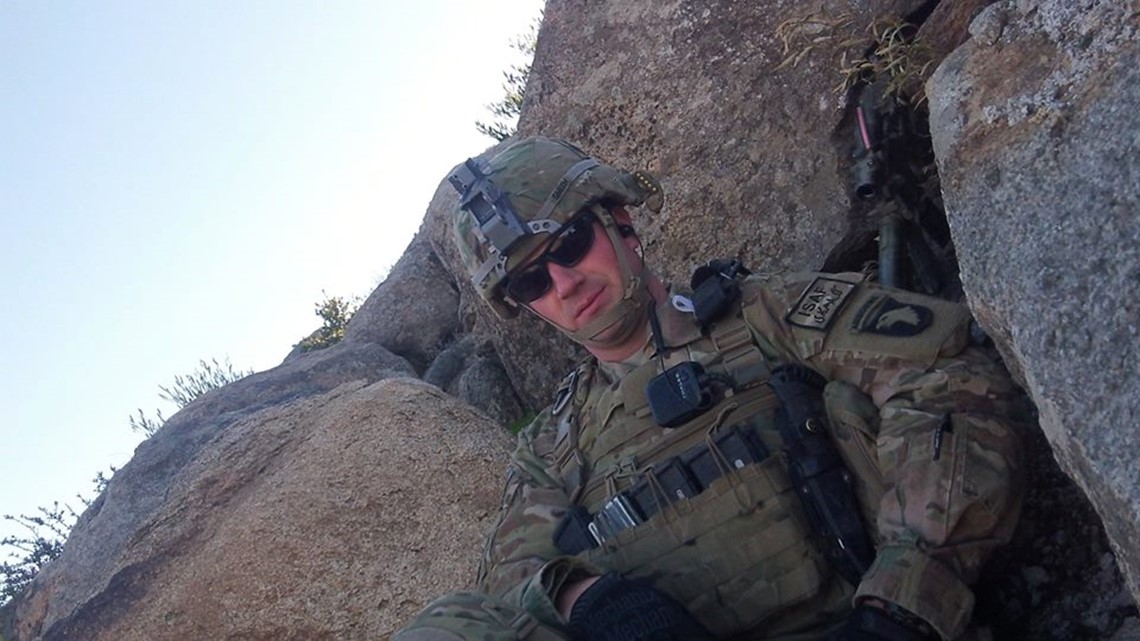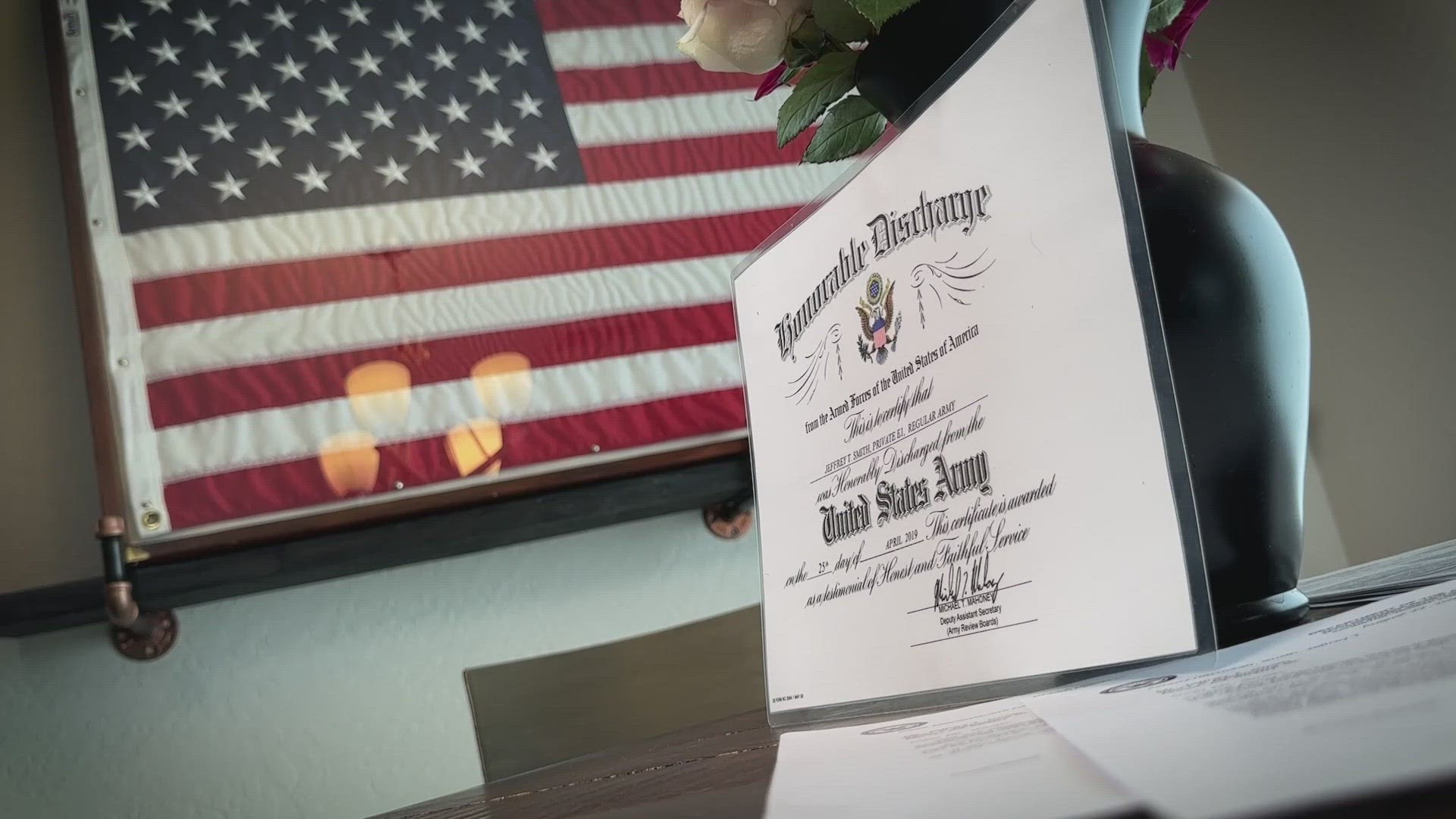SEATTLE — A U.S. military review board granted honorable discharges to two veterans who served in Washington, years after the Army punished and kicked them out for behaviors directly related to their combat trauma.
The veterans, Kord Ball and Jeffrey Smith, were featured in a 2018-19 KING 5 investigation after they received “other than honorable” discharges for misconduct that Army doctors said was a symptom of their severe Post Traumatic Stress Disorder (PTSD).
The reporting showed how Army leaders failed to act on the advice of their own medical experts, who warned against punishing the soldiers for behaviors their medical conditions caused. KING 5 found commanders repeatedly kicked soldiers out as troublemakers instead of using a medical separation process that would guarantee their access to long-term resources.
“I was just dumped out of the Army and didn’t have any support,” said Ball, who was kicked out in 2018 for failing a marijuana test and going absent without leave (AWOL) for seven days. “It was the hardest thing I’ve ever gone through. ... It tore my soul apart.”
Ball and Smith, who were separately stationed at Joint Base Lewis-McChord (JBLM), applied for discharge upgrades using a process Congress created decades ago to correct military injustices. The review boards often consider cases where veterans seek to prove their unfavorable military discharge was connected to mental health conditions, traumatic brain injury, military sexual trauma or sexual orientation under the “Don’t Ask, Don’t Tell” policy.
The Army Discharge Review Board voted to grant the veterans’ upgrade requests, noting in written decisions that the former soldiers’ other-than-honorable discharges were “inequitable” because their service-related PTSD “outweighed” their misconduct.
“Your story did have an impact. What you did meant something, and it worked,” said Smith, 39, who was booted from the Army in April 2019 for a series of alcohol-related incidents. “The effect it had was pretty mind blowing.”
The Army declined a KING 5 interview request and did not respond to written questions.
Other than honorable discharges are usually issued when a veteran is separated from the military for misconduct. Advocates for veterans describe it as a "U.S. scarlet letter" because the discharge status automatically strips away a veteran’s right to access a wide network of benefits, like long-term services from the U.S. Department of Veterans Affairs (VA).
“You don’t have access off the bat to VA health care, disability benefits, education benefits, housing benefits,” said Rose Goldberg, a long-time veterans’ attorney who now teaches veterans law at the University of California, Berkeley. “There’s a deep tragic irony there because essentially you're blocking the veterans who may be the most in need of VA support from accessing those supports.”
The VA has a separate process to make exceptions for some veterans whose misconduct was triggered by PTSD or other service-related trauma, but that process can sometimes take longer than a year and can be difficult to navigate, according to veterans advocates.
“There’s just a very common misconception that if you got kicked out with a less-than-honorable discharge, you must be a real dirt bag,” said Mo Siedor, director of legal services at Swords to Plowshares, a San Francisco-based veterans’ rights organization. “It can lead to them being at a higher risk of homelessness, criminal justice involvement and not getting the health and mental health treatment that they need in order to sort of rebuild their lives.”
‘I got turned down on quite a few jobs’
Smith, who moved with his family from Lacey to Mesa, Arizona, after getting kicked out in 2019, applied for a discharge upgrade in November 2020.
As he waited for the review board's decision, he said he spent years struggling to navigate his life
“‘Thank you for all your sacrifice. Here’s a kick to the stomach. Have a nice day.’ It was pretty much what it felt like,” he said. “I had no idea what to do with the rest of my life.”


After moving to Arizona, Smith said he successfully obtained VA benefits and also began receiving mental health treatment from a private doctor. But he struggled to get past the shame of how the Army parted with him after his decade-long career that involved three combat deployments to Afghanistan.
“It was almost like a dark cloud kind of following you wherever you went,” he said. “I wanted to block that 10 years out of my mind and not really discuss it with anybody. It was hard to talk about without getting angry.”
But during his job search, Smith said prospective employers demanded answers.
“Employers asked that question, ‘What was your discharge status?’ And I dreaded – dreaded – hearing that question,” he said. “I got turned down on quite a few jobs because of that.”
Army doctors found Smith’s trauma, which included PTSD and a Traumatic Brain Injury (TBI), was too debilitating for him to stay in the military. But instead of separating him with a medical discharge, the Army kicked out Smith for misconduct after he showed up to work drunk on two occasions and got a DUI.
Before his discharge, a mental health professional who diagnosed Smith’s PTSD determined that he was using alcohol to “avoid his trauma.” A VA-contracted psychiatrist who examined him the following year – two months before he got kicked out – came to the same conclusion, according to a review of Smith’s medical records. She determined he was using alcohol to relieve the “symptoms of his PTSD.”
Smith said he struggled with survivor’s guilt after listening over the radio to his friend, Sgt. Tyler Beechnaw, die in a firefight while in Afghanistan. He didn’t understand why Beechnaw died, yet Smith survived three separate IED blasts and dozens of firefights. He said he also clung to the horror of walking with his platoon through an Afghanistan village after the U.S. military hit it with mortars.
“Walking through there and seeing kids burnt up, or you see toys and stuff on the ground and schools and women burnt up. It never leaves you,” Smith said in an April 2019 KING 5 interview. “Stuff you’ve done in war that you know resulted in the deaths of small children and stuff like that, it makes it so much worse.”
In August 2023, nearly three years after applying for an upgrade, Smith received the news of the Army Discharge Review Board’s unanimous decision to grant his request for full honors.
“I kind of came out of the bedroom laughing a little bit because I almost couldn’t believe it,” he said.
In a memo explaining the decision, the board wrote it decided to grant the upgrade because Smith’s PTSD outweighed his alcohol-related misconduct. Along with an honorable discharge, they voted to change the reason for Smith’s separation from a “serious offense” to a “minor infraction.”
“It was a sigh of relief,” Smith said.
Smith said he continues to deal with his PTSD, but he’s made much progress rebuilding his life. He said he’s now working as a private security officer and he's enrolled in college.
“Getting kicked out kind of ruined that sense of pride, and now having it back is – it’s everything,” he said.
‘I gave up on a lot of dreams’
Kord Ball, who moved with his family from Shelton to New Hampshire after getting kicked out of the Army in 2018, received the news of his honorable discharge upgrade in December 2022.
“It was the highlight of my life," he said.
The news came down more than three years after a veterans service officer helped him apply.
Ball, who is now working in construction, said his other-than-honorable discharge status changed the course of his life.
“I feel like I gave up on a lot of dreams because of that," he said.
After leaving the military, he said he sought help from nonprofit veteran services organizations and eventually secured benefits from the Department of Veterans’ Affairs. But still, he said, he faced barriers because of his unfavorable discharge status, and it piled on to his existing mental health conditions. His diagnoses include anxiety, PTSD and a TBI.
“I’ve been in the dark spots of losing myself,” he said. “It put a major imprint on my confidence and my character. It made a major impact deeply on who I am. ... It exasperated my PTSD significantly”


When he was in the military, Ball’s doctors warned that could happen.
Multiple medical providers who treated him at Madigan Army Medical Center went out of their way to warn Ball's chain of command that his medical conditions, brought on by military service, caused his behavior. They said the situation was putting the soldier at risk of depression and suicide, and they urged commanders to choose a medical separation instead of an other than honorable discharge, according to a KING 5 review of his military records.
Ball said he used marijuana to help him cope with the aftermath of war. He said the things he witnessed on his 2011 deployment to Afghanistan — including a burning Humvee carrying soldiers and a mass casualty event — forever changed him. He attempted suicide multiple times, sought help from military doctors on hundreds of occasions and repeatedly checked into inpatient psychiatric wards.
In a 4-to-1 vote, the Army Discharge Review Board found Ball’s PTSD, TBI and other conditions “mitigated” his “misconduct of drug abuse and AWOL.” They also said the other-than-honorable discharge was "inequitable" because of his "length and quality of service," including "combat." The board voted to change the reason for Ball’s discharge from a “serious offense” to “minor infraction,” according to the 2022 decision.
“Just the feeling of something being an injustice and then that being corrected by the government felt good. It felt trustworthy. It felt like they’re doing the right thing, and it felt like this process is here for a reason, and I used it and it worked,” he said. “But there’s still some feelings of error and injustice because it took three years.”
'It's unconscionable'
Attorneys who help veterans seek discharge upgrades said the process is much lengthier than it should be – costing some veterans access to vital benefits and services as they wait years.
“They definitely need to be moving through these applications faster than they are,” said Siedor, the legal services director at Swords to Plowshares.
Veterans advocates said there’s recently been a big push aimed at helping more veterans get justice through the discharge upgrade process after they were kicked out under less-than-honorable conditions for behaviors related to their PTSD.
“Its unconscionable that people who sign up to join the military, take an oath, offer to serve the nation and risk everything in that pursuit, could be treated so badly,” said Mike Wishnie, director of the Veterans Legal Services Clinic at the Yale Law School.
Seeking better outcomes for veterans, Wishnie and his team have brought multiple class action lawsuits against military review boards, including the Army Discharge Review Board that considered Ball and Smith’s cases. The suit resulted in a 2021 settlement that demanded improvements.
“The Army Discharge Review Board agreed to substantially reform its procedures, how it weighed evidence, how it wrote its opinions and to go back and redo thousands of cases that it had rejected,” Wishnie said. “It does seem to be helping.”
While experts said the discharge review boards are improving their processes, they point out that problems still persist in the service. Attorneys said they are still regularly seeing new clients who have stories like Ball and Smith.
"These boards? They shouldn't have to exist," Wishnie said. "There's no question that the further upstream in the process this could be caught, the better for everybody. So when somebody's struggling? They should get treatment. They should get care if they have a condition that makes them unfit for service."

